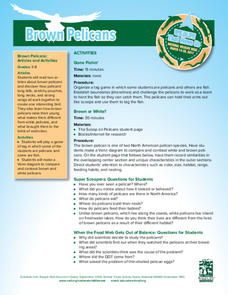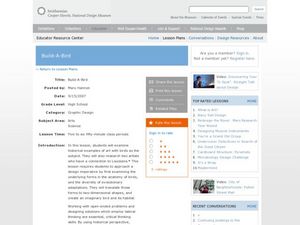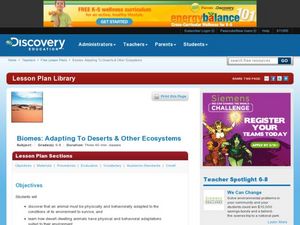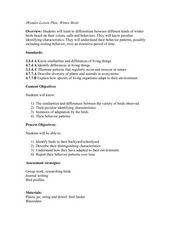Curated OER
Growing Penguins
A collection of photos and accompanying descriptions describing the life cycle of an Adelie penguin is the highlight of this resource. Working in groups, polar explorers match the descriptions to the pictures and create a timeline. An...
Polar Trec
Foraging for Fish in a Melting Arctic
How much do you know about the black guillemot of the Arctic region? With great background information, images, and a quick discussion, the class will learn all about the plight of the foraging seabird as they play a fun game. First,...
ARKive
Penguin Diversity – Mask Making
Penguins are very diverse and well-adapted birds; they live on islands, in warm and cold climates. Little ones examine penguin diversity and discuss the highly functional adaptive traits that have helped them survive in some of the...
National Wildlife Federation
Brown Pelicans
Even animals that are part of the same species have differences. Learners read a passage about white and brown pelicans and compare their features. They recognize that although the birds look very similar, they also have their own unique...
Curated OER
Fill The Bill
Students identify and describe five different types of beaks. Using that information, they explain how each of them is adapted to feed on different foods. In groups, they travel around the room to various stations in order to practice...
Curated OER
Amazing Bird Adaptions--Why Am I A Bird?
Fourth graders identify and classify birds found in Illinois. Using the internet, they discover how birds have adapted over time and how the adaptations have increased their life span. They compare and contrast the various adaptations...
Curated OER
Why Do Some Birds Have Two Homes When We Have One?
Sixth graders study migratory birds in the temperate forest and the tropical rainforest. In this migratory birds lesson, 6th graders participate in different activities that explain patterns of migration, research patterns of...
Curated OER
What Do You Know About the Birds Around You?
Students compare and contrast various species of birds. After participating in a brief discussion of the characteristics of birds, they view birds in their natural habitat and in pictures with a focus on the similarities and differences...
Curated OER
Common Adaptation Patterns
Students become familiar with common categories of animals and discover adaptation patterns and structures in animals that help them survive in different environments. Students identify major structures of common animals.
Curated OER
Adaptations of the Beak
Young scholars examine the principles of adaptation using mouth structure of animals as an example. Students look specifically at the various shapes of beaks of birds and the bill of the platypus.
Curated OER
Build-A-Bird
Students create an imaginary bird. In this anatomy lesson, students analyze how artists represent birds historically, then determine the anatomical aspects that suit a bird to its habitat. Using this information, students create an...
Curated OER
Birds: Wetlands Ecosystems
In this birds instructional activity, learners click on the links to learn about the birds of the Wetlands and answer short answer questions about it. Students complete 7 questions total.
Curated OER
Birds
In this biology worksheet, students complete a crossword puzzle with 34 questions on bird classification and characteristics.
Curated OER
Identifying Quincy's Birds
Students compare a variety or bird characteristics. They identify and classify birds within their local area. Students investigate how to examine and scrutinize differences in features of organisms and understand variation in the...
Curated OER
Biomes: Adapting To Deserts & Other Ecosystems
Young scholars examine how animals must be adapted to the conditions of its environment to survive. In this biomes lesson plan students research desert adaptations then discuss how these animals have survived.
Curated OER
Hawaiian Bird Beak Adaptation
Students explore adaptation by participating in a lab activity. In this bird characteristics lesson, students discuss the different purposes birds have for their beaks and conduct an experiment testing which beaks collect food best....
Curated OER
Selection and Variation in the Egyptian Origami Bird
Students investigate genetics and evolution of species. They simulate the breeding of birds using origami birds. In addition, using dice they introduce genetic variation into the species.
Curated OER
Prairie Scales and Prairie Smoothies
Sixth graders explore the animals that live on the prairie and identify differences between amphibians and reptiles and the adaptations each have made to live on the prairie.
Curated OER
Bird Beak Adaptation Lab
Middle schoolers investigate bird beaks to determine which physical adaptations are necessary based on the types of food the birds eat. They participate in a lab by visiting multiple stations to determine which beaks are most efficient,...
Curated OER
Seabird Survival Adaptation Card Game
Students study seabirds and how they have adapted to their environments. In this activity based instructional activity students will play a card game that will allow them to have a better understanding of seabirds and their...
Curated OER
iWonder Lesson Plan: Winter Birds
Students report on the colors, calls, behaviors, and physical characteristics of different winter birds. In this winter birds lesson plan, students also make a bird feeder.
Curated OER
Wetland Adaptation
Students participate in a simulation to investigate the impact of the wetland environment on the migration of birds. They discuss the patterns of migration they took and why they avoided certain wetlands.
Curated OER
Birds Learning Cycle Lesson Plan
Ninth graders explore the various adaptations of birds and compare differences and similarities of different birds.
Curated OER
Animal Adaptation
Students begin the lesson by observing animals in their natural habitat. Using the internet, they research the types of adaptations they have gone through to be able to live comfortably in their environment. They observe what they see on...

























